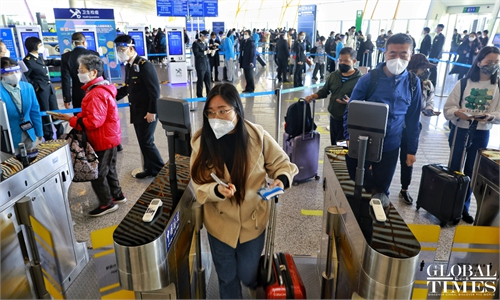China's health officials rule out possibility of further large-scale COVID-19 infection

Press Conference of the Joint Prevention and Control Mechanism of the State Council Photo: Zhao Yusha/GT
A number of localities in China are witnessing a small spike in COVID-19 infections, yet a large-scale outbreak is unlikely, officials from China’s National Health Commission (NHC) said on Wednesday.
The COVID-19 situation in China is stable in general, yet the number of COVID-19 cases is increasing in a handful of regions partly due to the fading away of herd immunity, He Qinghua, an official from the NHC's disease control department, said at a press conference on Wednesday, ruling out the possibility of a widespread outbreak.
He said that the number of COVID-19 cases in early April was at the lowest level in China since December last year, with numbers creeping up after the middle of April.
He said the increase is due to the fading away of a layer of herd immunity. People prone to infection include those who haven’t been infected before, those whose immune level has been decreasing, and people with immune deficiency.
Recently, discussions of COVID-19 infections went viral online as some netizens posted pictures of their positive antigen tests on Chinese social media, claiming they were "re-infected" with COVID-19.
Large gatherings expected during the upcoming May Day holidays will increase the risk of spreading of coronavirus, but the mass movement is unlikely to lead to a large-scale outbreak, said experts from China’s top health body. Officials said they will keep monitoring the COVID-19 infection in China and the mutation of the coronavirus.
China will keep emergency clinic departments open 24/7 during the May Day holidays and add personnel to respond to an expected spike in infections.
Currently, health authorities have not discovered evidence showing that new variant XBB.1.16 – referred to as “Arcturus” – can lead to severe cases or death, according to Chen Chao, an expert from the Chinese Center for Disease Control and Prevention. Chen said that China has detected 57 carriers of XBB.1.16 and its sub-variants.
Global Times


